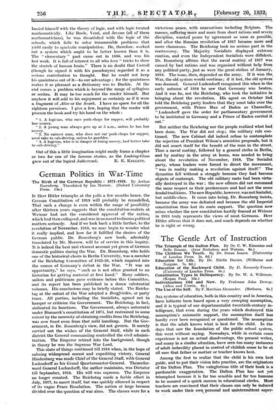German Politics in War-Time
IF Herr Hitler triumphs at the polls a few months hence, the German Constitution of 1919 will probably be remodelled. That such a change is even within the range of possibility after thirteen years suggests that the constitution-makers at Weimar had not the considered approval of the nation, which had then collapsed, and was in no mood to dismiss political matters seriously. And If we look back a little farther, to the revolution of November, 1918, we may begin to wonder what it really implied, and how far it fulfilled the desires of the German public. Dr. Rosenberg's new book, admirably translated by Mr. Morrow, will be of service in this inquiry. It is indeed the best and clearest account yet given of German domestic politics during the War. Dr. Rosenberg, who holds one of the historical chairs in Berlin University, was a member of the Reichstag Committee of 1925-28, which inquired into the causes of Germany's defeat in the War. "It was an opportunity," he says, " such as is not often granted to an historian for getting material at first hand." Many soldiers, sailors and politicians gave evidence before this Committee, and its report has been published in a dozen substantial volumes. His conclusions may be briefly stated. The Reichs- tag at the outset of the War adopted a Butgfrietlen, or party truce. All parties, including the Socialists, agreed not to hamper or criticize the Government. The Reichstag, in fact, abdicated its functions. The Government, always autocratic under Bismarck's constitution of 1871, but restrained to some extent by the necessity of obtaining credits from the Reichstag, was now freed even from that mild handicap. But the Gov- ernment, in Dr. Rosenberg's view, did not govern. It merely carried out the wishes of the General Staff, while in each district the General commanding controlled the civil adminis- tration. The Emperor retired into the background, though in theory he was the Supreme War Lord.
This state of things continued till 1916 when, in the hope of calming widespread unrest and expediting victory, General Hindenburg was made Chief of the General Staff, with General Ludendorff as his Grand Quartermaster-General. Thencefor- ward General Ludendorff, the author maintains, was Dictator till September, 1918. His will was supreme. The Emperor no longer counted. The Reichstag made a feeble effort in July, 1917, to assert itself, but was quickly silenced in respect of its vague Peace Resolution. The nation at large became divided over the question of war aims. The classes were for a victorious peace, with annexations including Belgium. The masses, suffering more and more from short rations and severe discipline, wiinted peace by agreement as soon as possible, and after the Russian revolution of 1917 benaine more and more clamorous. The Reichstag took no serious part in the controversy. The Majority Socialists displayed extreme caution, and even the Independent Socialists were diffident. Dr. Rosenberg affirms that the naval mutiny of 1917 was caused by bad rations and was organized without help from any political party, just as were the great strikes of January, 1918. The issue, then, depended on the army. If it won the, War, the old system would continue; if it lost, the old system was doomed. General Ludendorff recognized this when in the early autumn' of 1918 he saw that Germany was beaten. And it was he, not the Reichstag, who took the initiative in bringing about the revolution. His agent on October 2nd. told the Reichstag party leaders that they must take over the government, with Prince Max of Baden as Chancellor, "Ludendorff gave the order for parliamentary government to be instituted in Germany and a Prince of Baden carried it out."
But neither the Reichstag nor the people realized what had, been done. The War did not stop ; the military rule con- tinued. The new Cabinet did indeed refuse to contemplate the rejection of President Wilson's armistice proposals, but it did not assert itself for the benefit of the man in the street. Thus a naval mutiny, followed by a general strike in Berlin, and by mutiny in the army at home, was needed to bring about the revolution of November, 1918. The 'Socialist party, whose leaders were forced to direct the movement, " was in reality making a revolution against itself." The dynasties fell without a struggle because they had become objects of contempt. The old military caste had been virtu- ally destroyed in the war ; the new officers did not command the same respect as their predecessors and had not the same feudal traditions. The new Republic, however, was not Socialist, but middle-class. It came into being, Dr. Rosenberg insists, because the army was defeated and because the old Imperial constitution thus lost its main support. The question now' arises whether the new constitution hastily framed at Weimar in 1919 truly represents the views of most Germans. Herr Hitler affirms that it does not, and much depends on whether he is right or wrong.






































 Previous page
Previous page